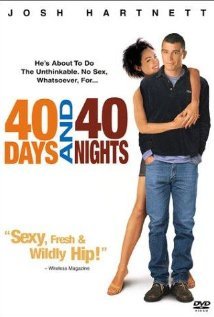“Sexual Appetites”

| None | Light | Moderate | Heavy | |
|---|---|---|---|---|
| Language | ||||
| Violence | ||||
| Sex | ||||
| Nudity |
What You Need To Know:
The Christian worldview meets a pagan worldview in 40 DAYS AND 40 NIGHTS, but the dominant message is that promiscuous, pervasive sex is the norm in the American workplace and social scene. Consequently, the movie contains plenty of foul language, explicit sexual references and nudity. Of course, Jesus tells us in Mark 7:20-23 that sexual immorality is an evil thing that makes us unacceptable to God.
Content:
(PaPa, C, ABAB, Ho, LLL, V, SSS, NNN, A, D, M) Uneven meshing of pagan and Christian worldviews, with many Biblical elements, including an explanation of Lent, resolving to keep a vow, citing the story of Jesus in the desert, tempted by the devil and taken care of by God and the angels, and specific Scriptures cited, inundated, however, with nudity, seduction, sexual symbols, lust, promiscuous sex, fornication, and self-gratification (no overt homosexuality, but a few homosexual references, including one same-sex kiss as seduction of opposite sex); about 44 obscenities, 14 profanities and 1 blasphemy, plus obscene gesture; some brief slapstick violence including a pratfall and man slaps another man; many sexual references to and some depictions of fornication, oral sex, masturbation, homosexuality, sadomasochism, and pornography, including dozens of names for specific anatomical parts and sexual acts; some partial male nudity but multiple scenes with female nudity, including pornographic pictures of women and couples having intercourse; alcohol use; smoking; and, betting and people deliberately try to tempt man to sin.
More Detail:
Out go the sex videos and magazines; down come the nude posters. Matt throws his energies into things like building model cars and doing topnotch work ahead of schedule. On a parallel plane begins a concentrated, graphic barrage of sexual language, symbols, acts, offers, and plots by “friends,” including a betting pool at the office and a website that informs “everybody” of Matt’s Lenten vow. All the guys in their Internet community join in the game of ensnaring Matt. The young women at work use every means of seduction to make him break the vow and restore their territory, i.e., their power to withhold sex from men.
Nicole, later dumped by her fiancé, returns to Matt. His rejection turns her into a “woman scorned,” out to destroy the vow. Nicole is such a one-dimensional character, however, that it is barely credible that Hartnett’s character would have been attracted to her.
Juxtaposed against the heavy battering of explicit sex is the advent of a beautiful romance with Erica, whom Matt meets in the laundromat. Because of the vow and the resistance to physical contact, the two develop a real relationship. They “hang out” – riding buses, walking, talking, laughing. The two young stars make the non-touch blossoming of love believable and hold the movie together.
Nevertheless, sex encroaches everywhere. Erica’s job? She is a “cyber-nanny” who searches the Internet for porn sites that open with seemingly innocent words and blocks those on her client’s computer so the children will not accidentally receive them.
As Matt gets closer to the 40th day, the graphic, distasteful burlesque increases. Matt becomes more strongly committed to his vow, even as he struggles with the onslaught of temptation, plots and physical realities as well as misunderstandings with Erica. His brother tells him that it takes years of discipline and character to fulfill such a vow, but Matt is determined.
40 DAYS AND 40 NIGHTS, from the producers of NOTTING HILL and BRIDGET JONES’S DIARY, is somewhat unnerving and confusing with its strange mixture of religious and redemptive messages with an all-out sex comedy – so boldface that it gets an R-rating. The biblical elements include the beauty of a blossoming, genuine romance, the growing commitment of a young man to a promise, and the healthy attitude about sex of Matt and John’s parents (the scene provides genuine humor.)
The movie portrays an acknowledgement of evil in the power of sexual obsession, the experience of Jesus in the desert, tempted by the devil, and taken care of by the angels, complete with specific Scripture references. The movie has its uplifting moments and makes many points about love, relationships, joy, tenderness, commitment, but most of them are “shouted down” by the movie’s main premise: sex rules.
Michael Lehmann has aimed this movie at an MTV crowd and seems to have hit his mark. The movie, billed as a romantic comedy, does have romance, but “bawdy sex comedy” would be a more accurate billing. That Josh Hartnett plays Matt with utmost intensity, making his character both believable and sympathetic in this milieu, attests to the star status he attained after this movie was shot. The release date for the movie was delayed several times, and shooting ended in late 2000. One has to wonder if Hartnett would choose this vehicle today.
40 DAYS AND 40 NIGHTS is almost certain to be a hit, which is regrettable because almost every “good” message is controverted by some disclaimer or action. A Christian worldview is injected on top of a worldview that is, on a practical level, pagan. Maybe the messages are inevitably mixed when a Christian perspective enters such a scenario and the sacred and the profane are mixed. Nevertheless, the overriding dominant message here is that promiscuous, pervasive sex is the norm in the American workplace and social scene.
With advertising targeted toward MTV demographics, it is valid to ask the question: Why target highly impressionable teenagers and young twenty-somethings, flooded already with hormones, with this kind of “humor” in the form of graphic language and sex, and then use two bright young stars to reel them in? Of course, Jesus tells us in Mark 7:20-23 that sexual immorality is an evil thing that makes us unacceptable to God.


 - Content:
- Content: 

